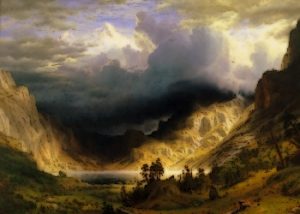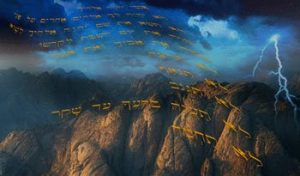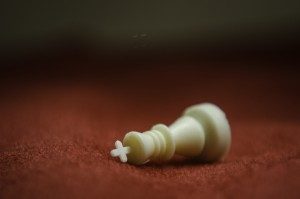 In this week’s reading, we find the well-known account of the spies who went into the Land of Israel. The Jews knew that they were supposed to inherit the land; the job of the spies was to find the best way to enter. Are the people strong or weak? Are their cities fortified? All of these were important for tactical reasons. At the same time, the spies were told to investigate the natural resources as well, to see what sort of land would be theirs.
In this week’s reading, we find the well-known account of the spies who went into the Land of Israel. The Jews knew that they were supposed to inherit the land; the job of the spies was to find the best way to enter. Are the people strong or weak? Are their cities fortified? All of these were important for tactical reasons. At the same time, the spies were told to investigate the natural resources as well, to see what sort of land would be theirs.
As far as the latter, they performed their task to perfection. They returned calling the land “flowing with milk and honey,” bringing clusters of grapes so large that two people were needed to carry one cluster on a pole. What a wonderful land it was!
But as far as how to enter and take that land was concerned, the spies veered from their mission. Instead of providing tactical advice, they abandoned all hope — they said it cannot be done. They decided that G-d would not keep his promise, and the Children of Israel would never inherit their land.
Only two spies opposed the consensus: Yehoshua and Calev. Calev told the people, “we should certainly ascend and we shall possess it, for we certainly are able to do so” [Num. 13:30].
What was his message? Rashi quotes the Talmud (Sotah 35), which says that this was far more than mere encouragement regarding their capabilities. “‘We should certainly ascend’ ““ even to Heaven. If he [Moshe] says ‘make ladders and ascend them,’ we shall succeed in all his words.”
Rav Moshe Feinstein explains that Calev provides us a model for all growth in Torah and performing G-d’s Will. Calev teaches us that it doesn’t matter if it looks impossible! Since what you wish to do is a “D’var Mitzvah”, something HaShem wants done, then if you try, He will help, and you will be able to do it.

 This week we read a very uncomfortable section of the Torah. G-d warns us that bad things will happen if we don’t keep His rules in His land. Keep the rules, He says, and things will be wonderful. But if you don’t, punishment will come to the Jewish Nation.
This week we read a very uncomfortable section of the Torah. G-d warns us that bad things will happen if we don’t keep His rules in His land. Keep the rules, He says, and things will be wonderful. But if you don’t, punishment will come to the Jewish Nation. A person is forbidden from overcharging, misrepresentation and deception, whether when buying or selling. This applies both to hidden defects in an object for sale, and purchasing a valuable antique at a cheap price because the seller is unaware of its true value.
A person is forbidden from overcharging, misrepresentation and deception, whether when buying or selling. This applies both to hidden defects in an object for sale, and purchasing a valuable antique at a cheap price because the seller is unaware of its true value. In this week’s reading, we read about the upcoming holiday of Shavuos, the time of the giving of the Torah to the Jewish Nation. But if you look in the Torah text, you won’t find that this was when G-d spoke to us at Mt. Sinai. Nowhere does it mention that this is anything other than a holiday of “Shavuos,” weeks (and a time for offering of first fruits). The name Shavuos is appropriate because we are told to count seven complete weeks following the first day of Passover, 49 days, and to celebrate this holiday on the fiftieth day. But why does the Torah not mention what the holiday is about? All it says is that after counting seven weeks following the offering of the Omer, on the second day of Pesach, there should be a holiday.
In this week’s reading, we read about the upcoming holiday of Shavuos, the time of the giving of the Torah to the Jewish Nation. But if you look in the Torah text, you won’t find that this was when G-d spoke to us at Mt. Sinai. Nowhere does it mention that this is anything other than a holiday of “Shavuos,” weeks (and a time for offering of first fruits). The name Shavuos is appropriate because we are told to count seven complete weeks following the first day of Passover, 49 days, and to celebrate this holiday on the fiftieth day. But why does the Torah not mention what the holiday is about? All it says is that after counting seven weeks following the offering of the Omer, on the second day of Pesach, there should be a holiday.
 This week, Rabbi Mordechai Dixler, our program director, shared with me a collection of Torah thoughts and concepts from Rav Avraham Elimelech Biderman of Bnei Brak, Israel. In a few short paragraphs Rav Biderman tied together our reading (Pikudei, the last portion in Sh’mos, the Book of Exodus), the Hebrew month of Adar, the holiday of Purim (the 14th of Adar, which this year begins on the eve of Thursday, March 24), and the fact that this week we conclude the reading of a book of the Torah — which means that in synagogue, after the final words of the portion are read, the assembled say “chazak, chazak, v’nischazeik” — “be strong and be strengthened.”
This week, Rabbi Mordechai Dixler, our program director, shared with me a collection of Torah thoughts and concepts from Rav Avraham Elimelech Biderman of Bnei Brak, Israel. In a few short paragraphs Rav Biderman tied together our reading (Pikudei, the last portion in Sh’mos, the Book of Exodus), the Hebrew month of Adar, the holiday of Purim (the 14th of Adar, which this year begins on the eve of Thursday, March 24), and the fact that this week we conclude the reading of a book of the Torah — which means that in synagogue, after the final words of the portion are read, the assembled say “chazak, chazak, v’nischazeik” — “be strong and be strengthened.”
 There is an interesting interruption at the beginning of this week’s reading. Last week we learned about the construction of the Mishkan, the Tabernacle, and this week we learn about the garments worn by the Kohanim, the Priests, when they served within it.
There is an interesting interruption at the beginning of this week’s reading. Last week we learned about the construction of the Mishkan, the Tabernacle, and this week we learn about the garments worn by the Kohanim, the Priests, when they served within it. When I saw the headline for the article on Torah.org, “
When I saw the headline for the article on Torah.org, “